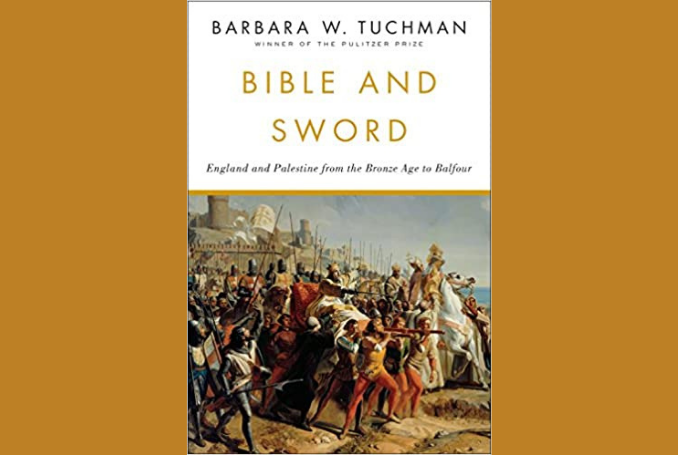
By Jim Miles
(Bible and Sword: England and Palestine from the Bronze Age to Balfour. Barbara Tuchmann. NYU Press, 1956; Preface, 1984; Random House, 2014)
Part of history is reading historical documents, and it is in this light that reading “Bible and Sword” by Barbara Tuchmann should be considered. It is beyond current events, but still within the lifetimes of a few, and is written about a series of earlier epochs. It is not Tuchmann’s best work and while it makes an interesting read and provides a good general thematic approach to the subject, it has a few problems.
Problems
The title suggests that this is about England and Palestine, but more correctly it is about England’s perspective on Palestine and very little on Palestine itself. The Middle East, in general, is portrayed from the ‘Orientalist’ western viewpoint of a rather primitive and backward place – which to be fair under the Ottoman empire it was allowed to be neglected during the last decades of its control and under pressure from various European empires for concessions and alliances.
Palestine itself, while not directly described, carries the narrative quite directly through cited sources as being the stereotypical western view as being an “empty land”, a land without people, a desert, with a few Bedouins wandering around. Further its biblical heritage is consistently upheld as truth backed by “science” although the scientific evidence is not presented.
The author herself is aware of her bias, but does not overcome it. Having a Jewish background she writes in the later preface (1984) “As regards the fortunes of the Jews and of Israel, I am not detached but emotionally involved.” When her publisher tried to have her write the history up to the 1948 nakba (certainly not a word she would have used) she objected that her “advocacy…invalidates the work of a historian” and for her to write that part of history “was all impossible to relate without outrage.”
The preface then continues with what at the time probably seemed like reasonable propositions. Tuchmann writes, “Sovereignty in Israel has imparted dignity, confidence, self-respect and a straighter stature to Jews wherever they live.” She sees Jews as no longer being the “butt for persecution….because Jews will no longer feel like victims. It is the vulnerable and the helpless who invite persecution, but…Israel [has] gained the courage and confidence of self-defense.”
This has some truth, but the majority of it – no longer the victim, no longer vulnerable and helpless – is not. Those two ideas are a large part of the ongoing Israeli narrative as to why it acts in the manner that it does. The Jews are forever proclaiming victimhood as per the holocaust and all the various holocaust memorials and memorial societies available. The politicians constantly advertise their vulnerability, and helplessness against attack in order to control their population as well as the susceptible populations of Europe and the U.S.
Yes, they have gained courage and confidence, backed up by their massive militarized security state, their arsenal of nuclear weapons, and their support and manipulation arriving from the U.S. Unfortunately, a lot of that “courage and confidence” involves subjugating another people to military rule in an apartheid state.
Christianity, while not directly denigrated, is certainly considered a lesser moral structure, with a touch of preaching by the author when she writes, “the Ten Commandments represent a code that men can follow…the Sermon on the Mount has been, so far, a code beyond the grasp of society.”
Eras
In a book that covers several different eras, some 2500 years generally, a narrow focus is required. With that, Tuchmann maintains a strong focus on how the British public, politicians, and religious leaders viewed Palestine.
Her first chapter “Origins: A Fable Agreed Upon” is a bit of a stretch, relying more on inventions and fables than historical or scientific work. She begins with pre-Celt Britons as having originated “from the same part of the world” – which is true as all people in Europe – apart from genetic lines that may have transferred back across Eurasia during the time of the Mongol hordes – all had to pass through this narrow neck of land to access the Levant and on into Europe. She goes on to say, “When the truth – that is verifiable fact – is unobtainable, then tradition must substitute.” Having acknowledged that, the first chapter becomes mostly substitute information and seems to be too much of an attempt to tie the British heritage directly back to the Israeli heritage.
After that, she works through more factual history, sourced through other older historical documents but not based on original research based on more current document discoveries (keeping in mind this was written in 1955). The following chapters do have a stronger more data-based thematic approach to what British perspectives were on Palestine.
Themes
Broadly speaking there are two themes as indicated by the title: the sword, being the military and strategic interests of politicians and business; and the Bible, being the moral rationalizations and attitudes towards Palestine [and as a side note here, Tuchmann does constantly use the reference to Palestine, indirectly negating the Israeli pretext that Palestine does not and never has existed]. The military as usual in western society supports the latter in its self-righteous efforts to control other people and places.
All the above criticism aside, Tuchmann does proceed through the different eras of British history demonstrating the rise and fall and rise and fall again of sentiments and actions towards Palestine and the Middle East. She looks critically at the crusades, passes on into the fundamentalism of the Puritan Christian Zionists, followed by an era of only passing interest while Britain sorted out her own religious power structures, and ending with the rise of a renewed Christain Zionism aligned with the efforts of Herzl and Weismann.
There are sub-themes. Britain wanted Palestine for its control of East Indian trade routes and to stop Russian, French, and German interests – hints of approaching World War I. Britain also developed a “moral” obligation to right the wrongs of Christianity imposed on the Jews over the centuries, an attitude willingly adopted by those interested in strategic purposes. Along with the moral purpose is the all-inclusive imperial belief in “civilizing benefits” and “manifest destiny”, attributes all empires call upon for domestic arguments – and alive and well in the current Anglo-American empire globally and still in the Middle East.
Another part of the search for a Jewish homeland was the desire to keep the east European Jews, considered undesirable, out of Britain. This latterly became a focus for Herzl and Weissmann as the assimilated Jews, now quite powerful in British political and social life, were quite unwilling to give money or moral support to the endeavor of renewing the Jewish homeland.
The Ottoman Empire, long considered on its way out, was also a consideration in establishing a British presence in Palestine through its avowed desire to settle Jews in the region. Not successful in obtaining concessions from the Ottoman leaders for transferring a Jewish population to Palestine, a more militaristic intention developed. Once the Ottoman empire was gone, its pieces were distributed between France and Britain with varying degrees of failure.
Postscript
Her postscript, where her outrage prevented her from going further, implies the outrage stems from British weakness and the enmity the British created in the region.
Tuchmann was alive during the 1967 war, at the time considered to be an attack upon Israel by combined Arab forces. What later documents have revealed is that the war was pre-emptive against Egypt, and then having succeeded so well there, proceeded on into Syria. She died shortly after the first intifada (1987) in December 1989. Since then, much has been revealed about Jewish methods in ethnic cleansing, war crimes, and the establishment of illegal settlements on Palestinian land (it’s all Palestinian) and the control of the indigenous people under military rule and many discriminating domestic laws, and the creation of an apartheid state.
I wonder where her “outrage” would be directed now, if her own personal timeline had permitted her to see how Israel currently operates in the region? She would have two choices: outrage at the manner in which Israel is currently being harassed by charges of humanitarian and war crimes against the Palestinians; or outrage at the manner in which Israel is treating the Palestinians under draconian military and domestic laws? Where would she stand on the label of apartheid by B’Tselem, on the IHRA definition of antisemitism, on the nature of the BDS movement?
Obviously, there are no answers to those questions as people can and do change perspectives with more time and more information.
Having presented a somewhat negative view of “Bible and Sword – England and Palestine from the Bronze Age to Balfour” it is worth the read, partly for its perspective on how much of the western powers thought of Israel only seven years after its war and declaration of its creation, and partly because it does outline the major themes involved in British perspectives towards Palestine, very few of them honorable from an indigenous viewpoint.
Her other writings – I have read all of them now – are much stronger and are well worth reading. Her style makes history accessible, removing it from the dryness of timelines and dates, making it more of a story than a history. Bible and Sword stops at the Balfour letter, but the whole era is better represented in her two works on the leadup to World War I: The Proud Tower (Random House, 1996/originally 1966) and The Guns of August (Presidio Press, 2004/originally 1962).
– Jim Miles is a Canadian educator and a regular contributor/columnist of opinion pieces and book reviews to Palestine Chronicles. His interest in this topic stems originally from an environmental perspective, which encompasses the militarization and economic subjugation of the global community and its commodification by corporate governance and by the American government.

– Jim Miles is a Canadian educator and a regular contributor/columnist of opinion pieces and book reviews to Palestine Chronicles. His interest in this topic stems originally from an environmental perspective, which encompasses the militarization and economic subjugation of the global community and its commodification by corporate governance and by the American government.







